Why are there food shortages in supermarkets? Key issues for fruit and veg supply crisis, is it due to Brexit
and live on Freeview channel 276
Supermarkets up and down the UK have been hit by fresh food shortages, with products like tomatoes, cucumbers and lettuce all disappearing from retailers.
The likes of Tesco, Asda, Aldi, Morrisons and now Lidl have all had to restrict the number of items customers can buy as part of a bid to maintain availability in their stores. But industry figures expect the crisis will run for at least several weeks, with prices likely to rise as a result.
Advertisement
Hide AdAdvertisement
Hide AdPoor weather in Spain and Morocco coupled with transportation issues and the knock on effects of the Russia-Ukraine war have all played a part in what looks set to be the worst food crisis since panic buying emptied stores during the Covid-19 pandemic. But the situation has also been exacerbated by how the UK food supply chain works, and other issues, like Brexit.
On Monday (27 February), the country’s biggest supermarket chains have all been summoned to meet with food minister Mark Spencer to explain “what they are doing to get shelves stocked again”. Spencer said he also wants “to outline how we can avoid a repeat of this [situation]”.
The food shortages began in the same week that National Farmers Union (NFU) president Minette Batters warned that “we should never take our food security for granted”. In a speech to the NFU annual conference in Birmingham, she called for greater support from the government to safeguard UK food production, as “volatility, uncertainty and instability” were all threatening it.
But what exactly are the issues, both at home and abroad, that mean UK food security is so fragile? NationalWorld has put together the five major problems that are threatening to combine to derail the availability of key fruit and vegetable products.
Money
Advertisement
Hide AdAdvertisement
Hide AdUnderpinning the woes the industry faces is money. Whoever you talk to in the supply chain, finances are a primary concern.
For growers and suppliers, they have to operate on tight margins as supermarkets push to keep their buying costs as low as possible. For supermarkets, they feel compelled to offer low prices or risk consumers - who have become accustomed to some of the lowest fresh food prices in Europe - shopping elsewhere. One retail commentator, Steve Dresser, has described the current system as a “doom loop price-driven market with consideration for little else”.
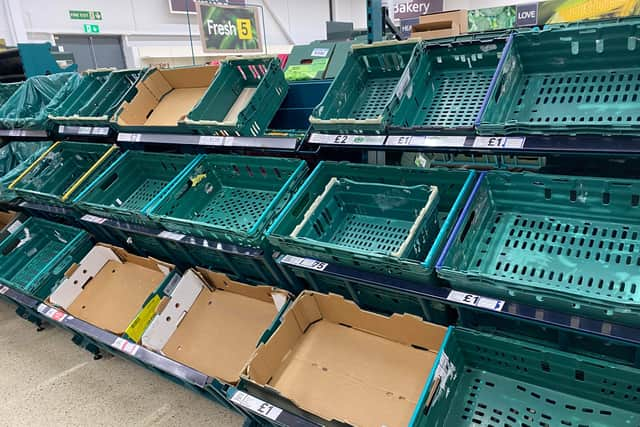

According to supermarkets expert Ged Futter, retailers follow a model based on annual contracts, which are “fixed prices negotiated and then held, regardless of what happens”. But in a highly inflationary environment, as we have now, he says chains are expecting farmers to “absorb [price rises] into their already wafer-thin margins” - a system which he says does not work.
The debates over who is meant to accept what price or absorb the inflationary pressure have become increasingly bitter in recent months as inflation has grown to record levels. In January, Tesco chair John Allan told the BBC it was “entirely possible” food suppliers were taking advantage of poorer households. His comments provoked outrage across the food industry.
Advertisement
Hide AdAdvertisement
Hide AdIn light of the current fresh produce supply crisis, suppliers have claimed supermarkets are letting shelves go empty rather than pay higher prices for Spanish and Moroccan fruit and vegetables. Prices have doubled in recent weeks due to tighter supplies - although food is still being produced and exported by both countries.
In a blog post, Tim O’Malley, the managing director of Nationwide Produce - a UK-based supplier and grower, which has a presence in Spain - wrote: “The retailers are locked in a price war and reluctant to move on price so I’m afraid they will continue to suffer from major shortages. We’re seeing empty shelves now and I can only see it getting worse over the next few weeks and months.”
According to Paul Rowe, head of procurement for salads and vegetables at Poupart Imports - an importer that supplies independent retailers and UK wholesalers - there have been instances of UK supermarkets refusing to put their prices up and Spanish “growers saying they will not be loading” their fruit and vegetables as a result.
Here in the UK too, growers have been cutting back on production as a result of minimal returns. According to a recent survey of its members, British Apples and Pears - the trade body for UK apple growers - more than a third of orders for new apple trees have been cancelled as a result of “unsustainable” returns from supermarkets.
Advertisement
Hide AdAdvertisement
Hide AdThe British Retail Consortium (BRC) - a trade body representing most of the UK’s biggest supermarket chains - refused to respond to NationalWorld’s question about whether its members alleged unwillingness to pay market prices was a reason for empty shelves. But it said its members were “working with farmers to ensure that customers are able to access a wide range of fresh produce”.
Ukraine war impacts
Much of the reason for why the fresh produce industry is facing such steep cost challenges is the Russia-Ukraine war.
The cost of fertiliser has rocketed because key ingredients, such as ammonia, come from Russia and therefore haven’t been as readily available as they were before the war. It also has an energy-intensive manufacturing process, which has meant production in the UK and Europe is not operating at full capacity - a major issue for food producers both here and on the continent.


Prices have come down from their 2022 highs but were still 10% higher than a year previously as of December 2022 and three-times higher than they were in December 2020, according to research by the Agriculture and Horticulture Development Board (AHDB).
Advertisement
Hide AdAdvertisement
Hide AdMeanwhile, fuel prices have also been an issue. The cost of diesel has been coming down from last year’s highs, but is still more expensive than it was before the war. This is a problem as farms need fuel for vital machinery, like irrigators that water crops, and transport to get their products from the farm to the supermarket.
But the biggest Ukraine-related issue of them all is energy prices. They soared to record highs in the wake of Vladimir Putin’s invasion last year.
While they are now coming down on the wholesale markets, these lower prices will not feed into domestic or business bills for some months yet - and this presents a major problem for food production given its tight margins (see above).
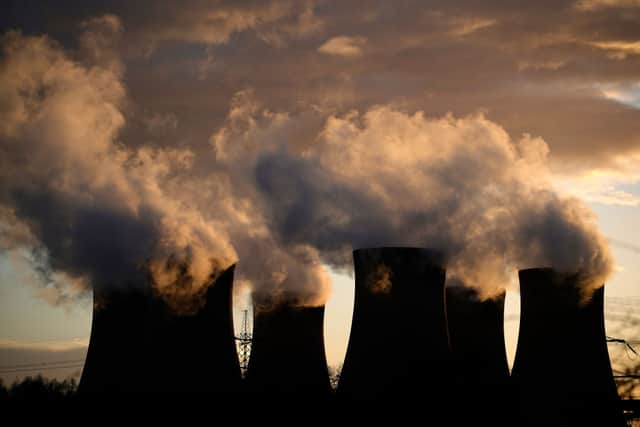

High energy costs are particularly problematic for glasshouse production - a growing process that requires a lot of heat and light and is used to produce fruit and veg, like tomatoes and cucumbers, in the colder months. While it is by no means our only source of fresh food at this time of year (most of it comes from Spain and Morocco) it can become important when the weather isn’t good for growing.
Advertisement
Hide AdAdvertisement
Hide AdThe owners of these facilities - both in the UK and in Europe - have been forced to either partially shut them down or leave the industry entirely due to high costs. In the Netherlands, which is the world’s second largest agricultural exporter behind the US, production is “probably in the region of 80% down” compared to what is normal for this time of year, according to chief executive of the Fresh Produce Consortium (the trade body for the entire fresh food supply chain), Nigel Jenney.
He says it is “one of the key reasons” behind why the current food shortages are as bad as they are.
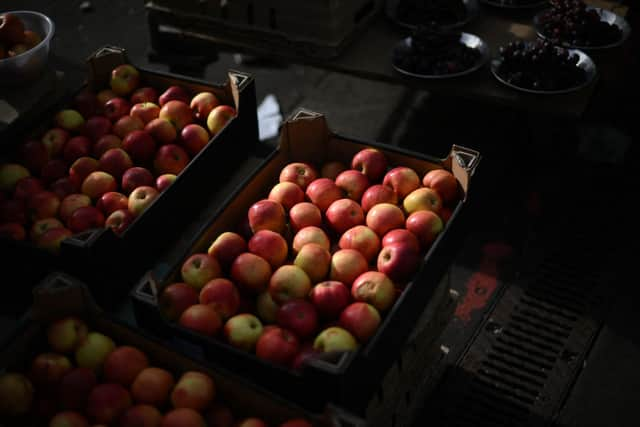

These high energy costs are also a major problem for farmers of other key crops, like apples and potatoes. These key fresh produce items are stored in climate and moisture-controlled facilities for several months after harvesting - facilities that have now become much more expensive to run than before.
With UK government business energy support set to become much less generous from April - and food production not qualifying for a higher level of support due to the government not classing it as ‘energy intensive’ - fruit and veg businesses could struggle to stay in business.
Brexit
Advertisement
Hide AdAdvertisement
Hide AdSince the shortages of tomatoes and cucumbers hit the headlines, many on social media have laid the blame for the situation at Brexit’s door. If you look at Twitter, #BrexitFoodRationing and #BrexitFoodShortages are both trending.
But while the UK’s departure from the EU has indeed created many problems for our food system, it has only played a small part in the empty shelves we’re currently seeing. Its biggest contribution to the current crisis has been an issue “with hauliers struggling to obtain UK visas for drivers” coming from Morocco, according to major supplier Thanet Earth. However, this issue is understood not to be widespread.
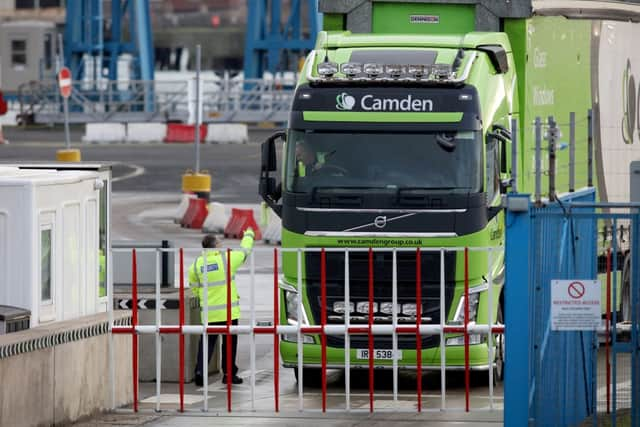

Brexit is likely to become much more of a problem when the UK introduces its own rules for border checks. Since the country officially left the EU in January 2020, it has mostly waved imports through entry points.
According to Nigel Jenney, it means “we have yet to feel the full impact of Brexit” - although he says the government has indicated it will make a big announcement in the “coming weeks”. He warns that any significant delays or bureaucracy would “drive costs higher” and would prove harmful to trade - something that is already being seen with exports to Northern Ireland, where the complexity of post-Brexit protocol rules have meant British suppliers have ceased sending their fresh produce over the Irish Sea.
Advertisement
Hide AdAdvertisement
Hide AdWhere Brexit has had an impact is on the amount of money farmers get in subsidy. The UK government has been winding down the payments growers used to get in the form of EU subsidy ahead of the implementation of a new environment-focused system. This has meant farms have struggled to raise enough money invest in their operations
Labour shortages
Closely interlinked with Brexit, but also a longer-term issue in itself, labour shortages have been a major problem for fresh food production.
The pool of people willing to pick and pack crops on farms - work that is physically challenging - has become smaller across Europe over the last decade. But the issue has become particularly acute in the UK since freedom of movement ended with Brexit.
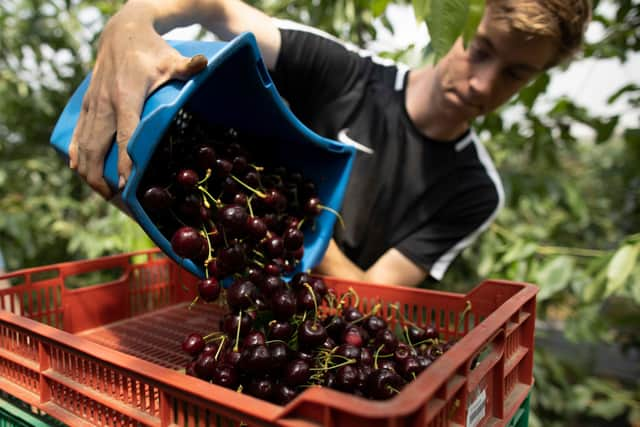

The government set up the Seasonal Agricultural Workers Scheme (SAWS) - first as a pilot in 2018 but now as a fully-fledged scheme - to grant temporary visas to foreign workers wanting to come to the UK to work on farms. Farmers wanted 60,000 to 70,000 visas under SAWS, but the government only allowed it to be upped to 30,000 in 2022 and 45,000 in 2023.
Advertisement
Hide AdAdvertisement
Hide AdNationalWorld has previously been told that this shortfall in workers has forced farmers to walk away from otherwise perfectly fine crops, and reduce the amount of fruit and veg crops they plant for future harvests. Efforts are underway to develop machinery or robotic processes to pick crops that currently have to be picked by human hands, but timescales are uncertain and it requires investment that tight margins do not allow for.
Climate change
The current shortages of tomatoes, cucumbers and peppers we’re seeing in supermarkets are partly to do with the weather extremes in both Spain and Morocco. While the issue in Morocco has been flooding, wind and rain storms, Spain’s problems have come as a result of unseasonably high temperatures over the New Year followed by a deep freeze and very little sun in the weeks since - conditions which have prevented normal crop growth.
A fresh produce industry figure with knowledge of the Spanish growing industry suggested to NationalWorld that climate change was playing an increasingly damaging role in the country’s production. “There are more and more extreme weather patterns, with temperatures going from hot to cold very rapidly,” they said. “We don’t get the staged seasonality we used to have.”
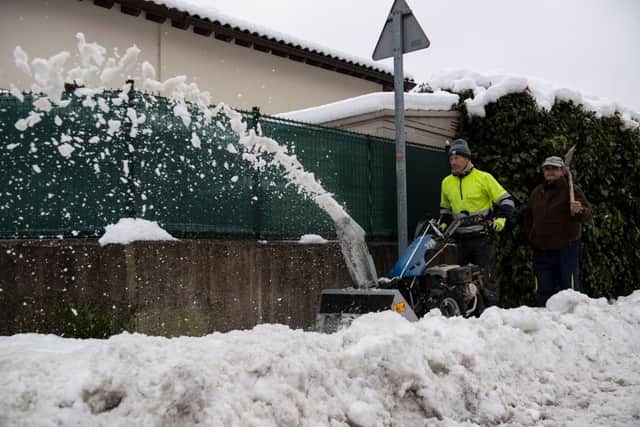

But while we get roughly a third of our food from European countries or near-neighbours, like Morocco, around 35% of our fruit and veg is produced in the UK where we face many of the same climate pressures.
Advertisement
Hide AdAdvertisement
Hide Ad“Climate change is a concern,” explains FPC’s Nigel Jenney. “A diverse range of sources - including UK production - is the answer to food security challenges. We are in the same boat as Spain with our weather. You only have to look at last summer [when UK temperature records were broken] to remember that.”
Mr Jenney adds that the investment the fresh produce industry is pouring into “protected production technology” - for example, methods like vertical farming, which involve crops being grown in vertical columns in specially adapted buildings - “may mitigate some of the challenges”. Many of these new technologies will be on show at an event his organisation has organised in March - FPC Future.
Comment Guidelines
National World encourages reader discussion on our stories. User feedback, insights and back-and-forth exchanges add a rich layer of context to reporting. Please review our Community Guidelines before commenting.
